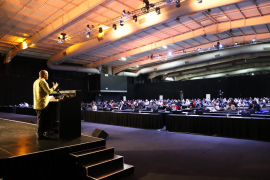
A summit has underscored the importance of improving the country’s state of water and sanitation service delivery.
Held at the Gallagher Convention Centre in Midrand, the two-day National Water and Sanitation Summit hosted by the Water and Sanitation Ministry, which started on Friday, follows a number of Ministerial Working Sessions undertaken by the Ministry.
The aim of the sessions was to assess, address challenges and find lasting solutions faced by the sector.
Addressing industry experts and stakeholders, Water and Sanitation Minister Senzo Mchunu re-emphasised the need for collaborative work between the public and private sectors, as well as communities and industry experts.
Mchunu said the department has already commenced with establishing partnerships with stakeholders.
“This is indicative of the role to be played by all of us in the sector. In addition to private-public partnerships, we have identified the need for all three spheres of government to work together, because ultimately, we are in office through the will of the people and we have to serve with honour.”
The Minister also reiterated President Cyril Ramaphosa’s remarks made during the State of the Nation Address two weeks ago, about the significance of water as a fundamental resource to life, development and economic growth.
“We have scientific backing that South Africa is a water-scarce country and it is for this reason that we all have to pull our weight to safeguard this precious resource. We will not hesitate to take stern actions against people who think it is okay to vandalise infrastructure. This comes to a stop now,” the Minister said.
Blue, Green Drop reports
To ensure the provision of good quality drinking water, the Minister added that the department is implementing the Blue and Green Drop Certification Programmes, which focus on the provision of excellent drinking water and wastewater quality management in the country.
“We will publish the reports of the programme towards the end of March 2022. As a sector regulator, we are focused on ensuring that compliance to legislation takes cause and remains dedicated to safeguarding that risks revealed through these programmes,” Mchunu said.
The review of Water Boards as a means for them to perform optimally was also emphasised. He said it is imperative for Water Boards to be economically viable in order to improve the delivery of water to municipalities. This as the department is set to establish a National Water Resource Infrastructure Agency.
Accountability
Speaking during a commission discussion, which focused on the management of pollution and water quality, Deputy Minister David Mahlobo implored experts in the water industry and officials in academia to hold government accountable, especially the department.
“If you have to criticise us in order for us to improve on the work which we are mandated to do, then do so but, please do it constructively and come up with recommendations on how we can all come together and work collaboratively for the future of the country,” Mahlobo said.
Industry experts committed to work closely with the department and other spheres of government to ensure that accountability and service delivery takes place.
Contemporary ways for water resources management
Meanwhile, Cooperative Governance and Traditional Affairs Minister, Dr Nkosazana Dlamini Zuma, implored the Water and Sanitation Ministry to consider contemporary ways of the management of water resources.
“As we seek to address and unpack current water challenges, we must employ alternatives such as the building of smaller and more cost-effective reservoirs closer to where people live and work. This will ensure that communities do not wait too long to access water... it will also secure affordability for municipalities, water authorities and residents,” Dlamini Zuma said. – SAnews.gov.za


